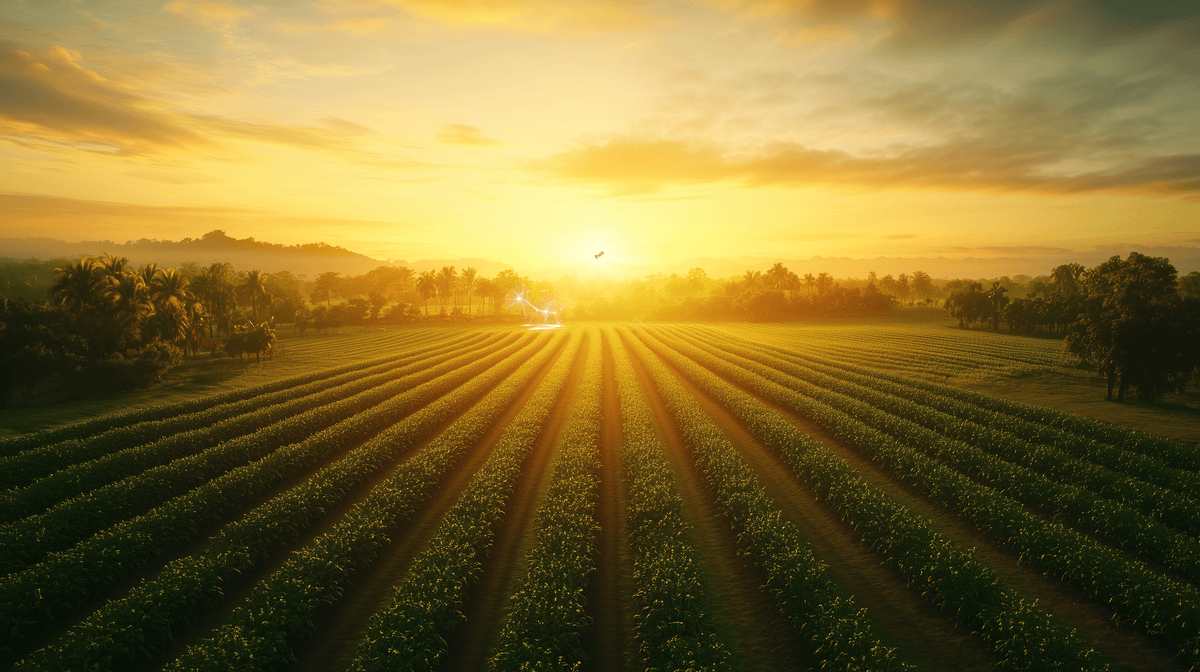
Smart Farming at Claros Farm: The Future of Sustainable Agriculture
|
|
Time to read 4 min
|
|
Time to read 4 min
Claros Farm is revolutionizing agriculture through smart farming practices that integrate cutting-edge technologies like IoT, AI, and robotics. By optimizing resource use, enhancing crop health, and promoting sustainability, the farm minimizes environmental impact while boosting efficiency and food security. Their innovative approach ensures better quality produce, cost-effective farming, and traceable food systems, paving the way for a sustainable future in agriculture.
In an era where environmental concerns and population growth demand innovative solutions, agriculture faces a pivotal challenge: how to produce more food sustainably while conserving resources. At the forefront of this transformation is Claros Farm, a pioneer in smart farming technology that is reshaping how we think about sustainable agriculture.
By integrating cutting-edge technology with eco-conscious practices, Claros Farm offers a glimpse into the future of farming—one that prioritizes efficiency, environmental stewardship, and food security. This article delves into the innovative approaches at Claros Farm and explores why smart farming is key to a sustainable agricultural future.
Smart farming refers to the use of advanced technologies like artificial intelligence (AI), the Internet of Things (IoT), data analytics, and robotics to improve agricultural practices. Unlike traditional farming, which relies heavily on manual labor and basic tools, smart farming employs precision agriculture to optimize crop yields, reduce waste, and minimize environmental impact.
At Claros Farm, smart farming is not just a buzzword—it's a way of life. By harnessing technology, Claros Farm has created an ecosystem where data-driven decisions lead to sustainable outcomes.
Claros Farm utilizes IoT sensors placed throughout their fields to monitor soil moisture, nutrient levels, and weather conditions in real-time. These sensors provide farmers with precise data, allowing them to adjust irrigation schedules, apply fertilizers more efficiently, and avoid overuse of resources.
For example, instead of watering an entire field, Claros Farm's smart irrigation systems deliver water only to areas that need it. This reduces water waste and promotes healthier crops.
Artificial intelligence plays a crucial role at Claros Farm. By analyzing vast amounts of data from drones, satellite imagery, and sensors, AI algorithms provide insights into crop health, pest infestations, and disease risks. This enables early intervention, saving crops and reducing reliance on harmful pesticides.
Additionally, AI helps predict optimal planting and harvesting times, ensuring that every stage of the farming process is as efficient as possible.
Claros Farm employs robotics to handle labor-intensive tasks such as planting, weeding, and harvesting. Robots equipped with machine learning algorithms can distinguish between crops and weeds, ensuring precision and reducing labor costs.
These robots also minimize soil disturbance, a key factor in maintaining soil health and preventing erosion.
Smart farming at Claros Farm goes beyond technological advancements—it embodies a commitment to sustainability. Here’s how:
By optimizing resource use and minimizing waste, Claros Farm significantly reduces its carbon footprint. Automated machinery and AI-driven solutions help lower emissions associated with traditional farming practices.
Maintaining soil health is a priority at Claros Farm. Practices such as crop rotation, minimal tillage, and precision fertilization preserve soil integrity. The use of cover crops and organic farming techniques further enhances biodiversity, creating a balanced ecosystem.
Water scarcity is a critical issue in agriculture. Claros Farm's precision irrigation systems save thousands of gallons of water annually. By focusing on water-efficient practices, the farm ensures that every drop counts.
Data is the backbone of smart farming at Claros Farm. From field sensors to drones, every device collects and transmits data, creating a comprehensive overview of farm operations. This data is then analyzed to uncover trends, predict challenges, and drive decisions.
For instance, if sensor data shows low nitrogen levels in a specific area, the farm can apply fertilizers only where needed. Similarly, weather data can inform planting schedules, reducing the risk of crop damage due to unexpected frost or storms.
Smart farming doesn’t just benefit farmers; it has a direct impact on consumers. By adopting sustainable practices, Claros Farm ensures:
Higher-Quality Produce : Precision agriculture results in healthier crops with fewer chemicals.
Affordable Food Prices : Reduced waste and efficient practices lower production costs, which translates to more affordable food.
Traceability : With IoT technology, consumers can trace their food from farm to table, ensuring transparency and trust.
Despite its promise, smart farming faces challenges such as high initial costs, the need for technological expertise, and data privacy concerns. However, initiatives like those at Claros Farm demonstrate that these hurdles can be overcome with innovation and collaboration.
The future of smart farming lies in expanding access to technology, fostering partnerships, and continuing research into sustainable practices. As these barriers diminish, smart farming will become the norm rather than the exception.
Claros Farm is more than just a farm—it’s a model for what the future of agriculture can and should be. By integrating technology with a commitment to sustainability, Claros Farm has set a new standard for farming in the 21st century.
As the global population grows and environmental pressures mount, the importance of smart farming cannot be overstated. It offers a pathway to meet the demands of tomorrow while preserving the planet for future generations. At Claros Farm, the future of sustainable agriculture is already here, and it’s brighter than ever.
Smart farming uses advanced technologies like IoT, AI, and robotics to improve agricultural efficiency. Claros Farm employs precision irrigation, AI-powered crop management, and robotic automation to optimize resources and enhance sustainability.
Claros Farm minimizes its carbon footprint through efficient resource use, water conservation, and practices like crop rotation and minimal tillage to maintain soil health and biodiversity.
Consumers enjoy higher-quality, chemical-free produce, affordable prices due to reduced waste, and transparent, traceable food systems from farm to table.
smart, smart, smart,

